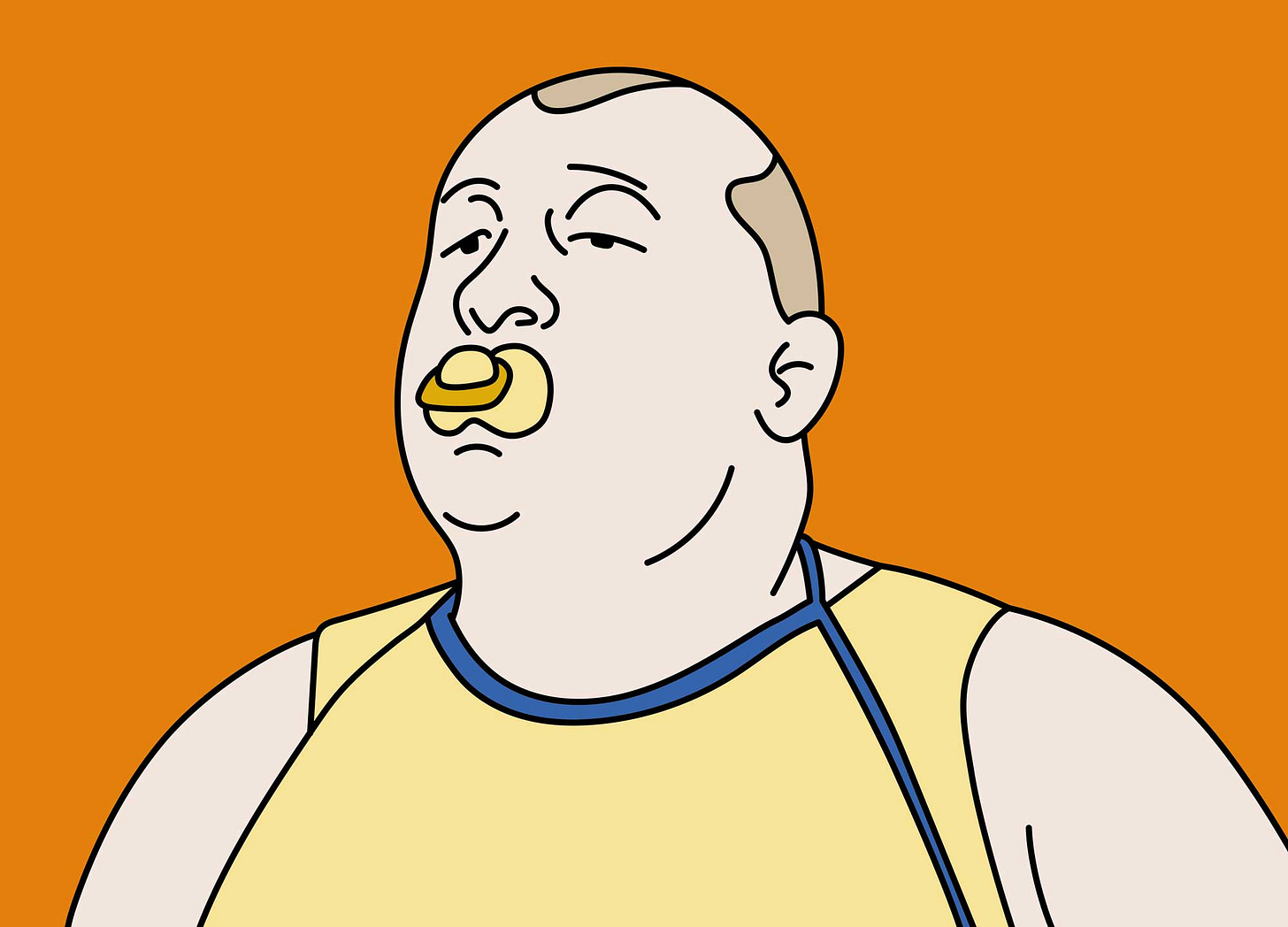Kidulteration
Civilisation is an Infantile Disorder
We are deranged in a manner which reminds us of childhood. For the uncorrupted, uncivilised child there is no past, which is what makes children innocent, as we all once were. The uncivilised child exists out of time; tomorrow has no meaning, it is identical to a thousand years in the future, which is why the civilised infants of our world, unrooted in the present, are so insanely demanding. Everything must happen for them now, because there is only now (or rather its frozen, postmodern image).
Civilisation infantilises by domesticating. Domesticated animals are retarded, gelded, soft, pliant, needy and sense-dimmed. They retain juvenile forms; floppy ears, round heads, childlike mewling and other neotenous traits. Humans likewise, after years, centuries, millennia of domestication, start to look and behave like children. The body becomes weaker, more frail and sickly, hairless, the eyes and head grow larger, all qualities which become more desirable, until, at the end of the civilising process, men desire smooth, pubescent baby-women and women delicate, doe-eyed man-boys; although, being children themselves, men also desire enormous round breasts and women, when they are ovulating, a degree of heavy-jawed apishness.
The child-people of civilisation, particularly late-civilisation, demonstrate sexual monomorphism; the sexes begin to resemble each other, as they do when children are young. The ideal becomes pre-pubescent sexlessness. The trend towards homosexuality and transsexualism, seen in other caged animals, is also an expression of juvenile asexuality, as are childish experiments with other-sex identities and same-sex pairings, which increasingly become part of the fixed adult self in late civilisation, all strenuously defended as ‘natural’.
The chthonic techno-womb is civilisation’s terminus,
a world of fat babies suckling on a steel tit.
Childish games are played for longer by civilised adult-children, and far more seriously. Highly domesticated adults can spend their entire lives playing games, particularly video games, and sports; running races and throwing things and the like. ‘Sportswear’—child’s wear—becomes common, as does ‘cosplay’, wearing the uniforms of children’s stories. Children’s stories themselves are enormously popular amongst domesticants; superhero stories and other forms of infantile wish-fulfilment.
Thus we find physical neotony is concomitant with cultural neotony. Culturally, the eternal juveniles of civilisation are struck dumb. They cannot speak fluently and they are unable to engage with their culture through the written word, preferring the symbolic image (the meme, the video, etc.). Indeed, they see themselves as images, maniacally sorted and graded from ‘cool’ to ‘not cool’ (or somesuch other childish tag).
Attachment to the image is attended by fear of the dark, or absence of image, which reveals a furiously suppressed unconscious, the result of the years of abuse that all civilised children undergo; being ignored, confined, poisoned and prevented from selfless communion with their own nature. This leads to fear of the dark which, like fear of death, results from the rampant egoism of the sick and corrupted child, which views the entire universe as an enemy or as an extension of itself (hence the childish need to blame objects for one’s problems; it is the hammer’s fault I banged my finger). Anything which even suggests the reality of the other is a source of frustration, fear or dread.
The egoism of the corrupted child cuts off both subjective and objective routes to the other. Subjectively, the infantile mind is self-absorbed, unable to experience a conscious stillness that reaches beyond my self. Objectively, all experience is translated into what I want or don’t want; no fact, no limit can intrude upon the rampant desires of the retarded self, the inevitable consequences of which being 1) a mania for specialness (the obsessively curated opposite of generous uniqueness) 2) an inability to empathically experience other people and things (and therefore; immorality), 3) either common-or-garden stupidity or the forceful void of mere intellect and 4) constant contention; the arguments of children, in which experience is replaced with mere emphasis; a series of egoic assertions more or less cleverly concealed or, if none of that works, spite, sarcasm and sadism.
Pathological egoism demands total stasis; an unchanging (albeit, to satisfy egoic restlessness, ever novel) state of total, numbed, security. This is why the civilised child-mind depends on parental surrogates—professionals, celebrities, authorities—and yearns to return to the womb, imagined as a technosphere in which all needs are immediately met and in which no threats—above all no responsibility—can ever intrude. This, the chthonic techno-matrix of the foetal-mind, is civilisation’s terminus.


